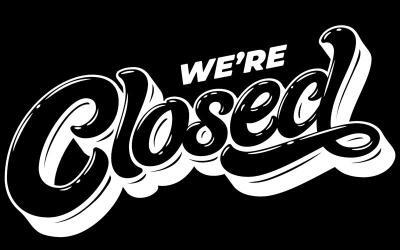Owning a small business is the American dream. But sometimes, despite all the hard work, that dream turns into a nightmare and businesses don’t make it. Understanding why small businesses fail can be as crucial as knowing the secrets of those that succeed.
Being aware of the signs of business failure can help you spot when you need to take immediate action to keep your business going. Here’s what to avoid.
1. Lack of Experience
The challenge: Many new entrepreneurs have no prior business experience or are unfamiliar with the industry of their startup. They may not understand the basics of running a business, such as marketing, finance, and accounting, or the specific needs of this particular industry. This lack of experience can lead to mistakes that can ultimately sink a business.
The solution: Get experience. Before you start your own business, get experience working for someone else. This allows you to learn the ropes and make mistakes without risking your own money. Another option for gaining experience is to take some business courses online or in person. Chances are you can find just what you need at a local community college for little cost.
2. Lack of Market Research
The challenge: Many small business owners are so enthusiastic about their business idea because it’s based on their passion or a hot trend that they jump into starting without doing any research. However, passion doesn’t always translate to demand, and trends may actually be fads with little staying power.
The solution: Before investing time, energy, and money, it’s crucial to assess the market. Is there a long-term demand for the product or service? Who are the competitors? What differentiates your business? Comprehensive market research is the foundation upon which successful companies are built.
3. Poor Planning
The challenge: Many small business owners skip the business planning phase, thinking it’s only for large corporations or startups seeking investors. That’s faulty thinking. Writing a business plan ensures you don’t overlook crucial steps like market research (see #2) or financial projections.
The solution: Business plans are roadmaps. They help you set clear goals, determine your target audience, identify potential challenges, and establish a clear vision for the future. Business plans should include your goals, strategies, and financial projections. Without a business plan, it’s easy for a business to veer off course and fail.
Whether a detailed document or just a few pages, a business plan can make the difference between aimless wandering and a strategic journey.
4. Poor Cash Flow Management
The challenge: Insufficient cash flow is one of the primary reasons why small businesses fail. Many new business owners underestimate the cash needed to start and run a business. Overhead costs, unexpected expenses, and slow-paying clients can lead to cash flow challenges.
The solution: Regularly monitor your cash flow. Use financial tools and software to forecast and track income and expenditures. Collect outstanding invoices. Keep a six-month emergency fund, and be cautious with large, unnecessary expenditures, especially in the early stages.
5. Not Embracing Digital Solutions
The challenge: Let’s face it, we’re living in a digital age. You cannot ignore or underestimate the power of online visibility and digital marketing.
The solution: A strong online presence can significantly boost brand awareness and sales from Google searches to social media interactions. Invest in a professional website, engage with your customers on social platforms, start an online newsletter, and consider online advertising based on your target audience. Being a digital company also includes accepting digital payments like Apple or Google Pay.
6. Getting Stuck
The challenge: The marketplace, technology, and consumer preferences constantly evolve. Businesses that cling to outdated practices or fail to adapt often get left behind. Learning to pivot was key for survival during the COVID-19 pandemic, but it’s just as crucial today.
The solution: Stay current with consumer and industry trends. Ask your customers for feedback and monitor comments on your social networks and ratings and reviews sites like Yelp. Be willing to pivot when necessary. This might mean upgrading technology, rebranding, or even changing your business model.
7. Neglecting the Customer
The challenge: Unhappy customers are a key reason why small businesses fail. Some business owners spend so much time scaling or managing operations that they overlook taking care of their customers.
The solution: Prioritize customer service. Satisfied customers become loyal and more likely to refer their friends and colleagues. Handle complaints quickly (and politely), respond to feedback, always aim to exceed customer expectations, survey your customers to find out what they think you’re doing right or wrong, and be responsive to their suggestions.
8. Not Building a Strong Customer Base
The challenge: Just because you’re earning enough money to pay your bills or make a profit doesn’t mean your business is on solid ground. Too many small businesses depend on one or two clients for most of their sales. This is dangerous behavior and one of the reasons small businesses don’t succeed.
The solution: Diversify your client base, so no one customer should account for most of your sales. A diversified client base reduces your risk in case your primary customer cancels their contract or goes out of business. Diversifying your customer base can help you reach new markets and grow your business. By targeting different types of customers, you can expand your product or service offerings and increase sales.
9. Opening in the Wrong Location
The challenge: Opening a business in the wrong location can quickly put you out of business. Don’t pick a storefront or office based solely on the cost of rent.
The solution: Factors to consider when choosing the best location for your small business where your customers live or work, street traffic, access to public transportation, adequate and well-lit parking, the space you need now and for the next few years, distance from competitors, condition of the building, proximity to other businesses that attract customers, and access to a skilled workforce.
10. Not Asking for Help
The challenge: Don’t think asking for help is a sign of weakness or ignorance. It would be impossible for a new business owner to know everything about running a business.
The solution: You can get low- or no-cost advice from the Small Business Administration (SBA) and its resource partners, the Small Business Development Centers, and SCORE. Trade organizations, local chambers of commerce, and city or county organizations may also provide advice and mentorship. If you need more assistance, consider hiring a business coach.
Other Reasons Small Businesses Fail
Being aware of the risks of business ownership can help you avoid failure. It’s also essential to set realistic goals. You’re not going to become a millionaire overnight and this means being patient.
Entrepreneurship is not easy. There will be times when you want to give up. But don’t give up on your dream. And remember, every setback or failure is a lesson, showing you what not to do the next time. Embrace the learning, adapt, and forge ahead.





